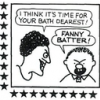-
Sign up for free and receive a month's subscription
You are viewing this page as a guest. That means you are either a member who has not logged in, or you have not yet registered with us. Signing up for an account only takes a minute and it means you will no longer see this annoying box! It will also allow you to get involved with our friendly(ish!) community and take part in the discussions on our forums. And because we're feeling generous, if you sign up for a free account we will give you a month's free trial access to our subscriber only content with no obligation to commit. Register an account and then send a private message to @dave u and he'll hook you up with a subscription.
Arne Slot
-
Recently Browsing 3 members
-
Who's Online 125 Members, 5 Anonymous, 1,028 Guests (See full list)
- Jairzinho
- Mudface
- Tenfolder
- George Costanza
- waddy78
- Preston Red
- El Dangerous
- Torvald Utne
- Rushies tash
- Fugitive
- Smell The Glove
- Tony Moanero
- foamer simpson
- Andykj
- Nelly-Szoboszlai
- Carvalho Diablo
- NoelM
- johnsusername
- Carradona
- DJLJ
- BigGamesJames
- TD_LFC
- Daisy
- Bolo locks
- Lurtz
- magicrat
- Leyton388
- Creator Supreme
- Boomer
- Funkasy
- Harry's Lad
- Wezza
- Red Phoenix
- Captain Willard
- littletedwest
- etho
- Pidge
- Shitty Arse
- VERBAL DIARRHEA
- Megadrive Man
- Jhinge Machha
- Reckoner
- andye1772
- Lee909
- Champ
- suzy
- El Rojo
- 1805
- Red Shift
- Curly
- noid
- Colt Seavers
- diamondjoe
- Johnlj
- Larks
- Elite
- detour
- Muy Guapo
- red_herring
- BeefStroganoff
- Beno
- Bjornebye
- M_B
- bizzle10
- Planet Origi
- an tha
- LFC 6 Times
- TheHowieLama
- David Keelaghan
- Rex
- Eric Swindle
- Kamma
- Edward.
- John102
- Em City
- Kevin D
- Elvinho
- Jarvinja Ilnow
- Grinch
- Jimmy Hills Chin
- YorkshireRed
- AngryOfTuebrook
- The Brom
- Captain Howdy
- Aventus
- The Guest
- Sparky
- joeyk
- deiseach
- clangers
- Double 86
- Joey8FrogsLegs
- Jennings
- bossy
- Baltar
- Rico1304
- dcl
- Jack the Sipper
- Bingo
- ObifanForLife
- rustychops
- polymerpunkah
- Rick Sanchez C-137
- Moonraker
- eric rotterdam
- lifetime fan
- XabiA
- RJ Fan club
- Bloke
- Special K
- Code
- TheSire
- cloggypop
- Trojan1892
- TheGow
- Taliesin
- tokyojoe
- carallo
- Arnaud
- Le Duan
- Atticus Finch
- skend04
- Blb
- russell.banks
- gumps




Recommended Posts
Join the conversation
You can post now and register later. If you have an account, sign in now to post with your account.